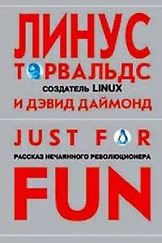Linus Torvalds - Just for Fun
Здесь есть возможность читать онлайн «Linus Torvalds - Just for Fun» весь текст электронной книги совершенно бесплатно (целиком полную версию без сокращений). В некоторых случаях можно слушать аудио, скачать через торрент в формате fb2 и присутствует краткое содержание. Город: NewYork, Год выпуска: 2001, ISBN: 2001, Издательство: HarperCollins Publishers, lnc., Жанр: Программирование, на английском языке. Описание произведения, (предисловие) а так же отзывы посетителей доступны на портале библиотеки ЛибКат.
- Название:Just for Fun
- Автор:
- Издательство:HarperCollins Publishers, lnc.
- Жанр:
- Год:2001
- Город:NewYork
- ISBN:0-06-662072-4
- Рейтинг книги:4 / 5. Голосов: 2
-
Избранное:Добавить в избранное
- Отзывы:
-
Ваша оценка:
- 80
- 1
- 2
- 3
- 4
- 5
Just for Fun: краткое содержание, описание и аннотация
Предлагаем к чтению аннотацию, описание, краткое содержание или предисловие (зависит от того, что написал сам автор книги «Just for Fun»). Если вы не нашли необходимую информацию о книге — напишите в комментариях, мы постараемся отыскать её.
Just for Fun — читать онлайн бесплатно полную книгу (весь текст) целиком
Ниже представлен текст книги, разбитый по страницам. Система сохранения места последней прочитанной страницы, позволяет с удобством читать онлайн бесплатно книгу «Just for Fun», без необходимости каждый раз заново искать на чём Вы остановились. Поставьте закладку, и сможете в любой момент перейти на страницу, на которой закончили чтение.
Интервал:
Закладка:
Over the years, some have suggested that the university was trying to take credit for Linux. That wasn't the case. The department had always been very supportive. They even gave me a job that enabled me to work on Linux on their time. And that was in the early days, so nobody was saying, " 'Let's push this because some day it will be world famous." But at the same time they were pleased to be a big part of the announcement. It provided great public relations. I know there are now more Swedish-speaking students in the computer sciences department, which had always been overshadowed by the Polytechnic University.
Success envy is considered a Finnish cultural characteristic. And as Linux became better known in the world at large, I got a lot of questions about whether I had problems with people at the university being envious of me. The opposite turned out to be true; they were very supportive. Early on they started getting rid of X terminals and installing PCs with Linux instead.
The announcement launched Linux into the above-the-radar zone in Finland, and it started generating publicity elsewhere, too. A lot of the early headlines came about because some journalist had stumbled over Linux and got excited about it. From a business standpoint, Version 1.0 was never very challenging to any of the big players. Linux was getting the market that Minix and Coherent had. But there was little attention outside that community, which was fine. It was far more attention than I had expected initially.
Regardless, journalists, mostly from trade publications, started knocking at my door -- literally. It didn't make Tove happy to wake up on a Saturday morning to find a Japanese reporter bearing gifts -- usually watches, as they probably heard somewhere that I have a thing for them -- and wanting to do an interview. It made her even less happy when I would invite them in. (It was a pattern I would repeat for years, until we made our new house a Journalist-Free Zone. In my least considerate moments, I would even forget to tell Tove that I had invited a journalist to our house for an interview -- and I would forget, too. The reporter would show up and Tove would have to entertain him or her until I made it home.) Then there were the fan websites that started popping up, such as the one based in France that primarily consists of a much-updated gallery of embarrassing photos of me. Like the one of me from a Spektrum meeting: I'm shirtless, drinking a beer, looking studly.
Not.
And it wasn't only journalists or Linux hacker types who were showing an interest. Suddenly, people with big expense accounts wanted to talk to me about their technology. Unix had long been seen as an operating system with vast potential, mostly because of its power and multitasking capabilities. So corporations that were interested in Unix started keeping an eye on Linux. One of those was the networking company Novell, which had started a skunkworks project based on Linux. It was a Unix desktop they evolved called Looking Glass. It looked nice, but it was up against a wall: It lacked the standard of the time, which was the Common Desktop Environment.
In August 1994, they said they would pay me to visit them in Orem, Utah, to talk to them about their desktop. Novell was offering me my big chance to see America, so I told them I would accept if they would pay for me to visit another U.S. city. Even as an unworldly Finn I kind of suspected that Orem -- and even Salt Lake City -- weren't quite representative of the rest of the country. They suggested Washington, D.C., but I didn't want to go there. I figured it would be just like any other capital. They suggested New York, but I thought it would be more interesting to go to California.
Inside Novell's headquarters, it was hard to determine just how serious people were about the project. (In the end, they ended up being not very serious at all; they eventually killed the project, and the nine people involved started up Caldera.) But I was getting my first taste of the United States, where I somehow figured I would live at some point in my life. Novell's commitment to Linux notwithstanding, the United States seemed to be the center of the growing technology universe.
My visit to the United States was a bit of a jolt. The first thing that struck me was how new everything was, compared to Europe. The Mormon Church had had its 150th anniversary a few years before my visit, so they had cleaned up the main temple. It was shining white. Coming from Europe, where all the churches are old and have the patina of time, I could only think of one thing when I saw the white temple: Disneyland. It looked like a fairy-tale castle, not a church. And in Orem I made the mistake of checking out the hotel's sauna. It was one of those porta-potty saunas, literally made of plastic, and it was barely hotter inside than outside. I came away from it thinking they can't do saunas in the United States and feeling a little homesick.
And I started learning the ropes. Just as visitors to Finland learn quickly not to start up conversations with random strangers in bars, I learned that in Utah -- and, I later learned, the rest of America -- you cannot rationally discuss the subject of abortion or rifles. There's a 50-percent chance that you'll get somebody who's very emotional about those issues, and it's easy to get into a big fight about something that shouldn't be fought about. People don't get hung up about those issues in Europe. The reason people get so defensive about their own positions in the United States is that they've heard the other position so much. There are probably more rifles per capita in Finland than in many other places, but they're mostly used for hunting. It's not a big thing.
Another thing I quickly learned during my first days on U.S. soil: Root beer sucks. [1] Boy, that has to bean acquired taste. I'm guessing it started out with Puritans who couldn't drink beer because it has alcohol. So they concocted a beverage that didn't have alcohol in it and happened to be made with roots, and they called it "root beer" to fool people into thinking it was good stuff. And after ten generations of people being fooled into thinking it was good stuff, people bought into it. Today, Americans like root beer because they have ten generations of genetic engineering behind them.
After Utah, I Hew to San Francisco and really, really liked it. I spent so much time walking around the city that I developed a major case of sunburn and had to remain indoors for an entire day.
I remember walking across the Golden Gate Bridge, looking up at the Marin Headlands, excited about the possibility of hiking in those hills as soon as I crossed the bridge. But by the time I made it to the Marin side, I had lost all interest in walking anymore. I could never have predicted that six years later, almost to the day, I would be sitting at the crest of those windy Headlands, looking out on the Pacific Ocean, San Francisco Bay, the bridge, the fog, and San Francisco itself, explaining all this to David's tape recorder.
It would take only a year for me to return to the United States. I came back to speak at DECUS, (Digital's User Group) in New Orleans. There were only forty people at the meeting, so it wasn't a terrible ordeal. Best of all, that's when I met Maddog, a.k.a, Jon Hall. He was a technical marketing person for Digital Unix and an old-time Unix user. He was responsible for sending me over for the talk. Maddog, who is known for his chest-length beard and his absurd sense of humor (not to mention his propensity to snore), heads Linux International, an organization that works to support Linux and Linux users. He's also a godfather of my daughter Patricia.
Another legacy of that New Orleans meeting: Maddog arranged for Digital to lend me an Alpha. That's how Linux got ported to something other than a PC. Before that time, people had ported Linux to other architectures. There was a port to a 68K, the Motorola 68000 machines used by Atari and Amiga. But in those cases Linux didn't work on both platforms at the same time. To make that version of scaling work, you rip out the pieces that don't work on the new platform and you write new pieces. But the Alpha was the first real port of Linux. Basically the same sources worked on both the PC and Alpha. You add an abstraction layer so that the same code gets compiled in two different ways to work on two different architectures. It's still the same code, but it ends up working on different architectures.
Читать дальшеИнтервал:
Закладка:
Похожие книги на «Just for Fun»
Представляем Вашему вниманию похожие книги на «Just for Fun» списком для выбора. Мы отобрали схожую по названию и смыслу литературу в надежде предоставить читателям больше вариантов отыскать новые, интересные, ещё непрочитанные произведения.
Обсуждение, отзывы о книге «Just for Fun» и просто собственные мнения читателей. Оставьте ваши комментарии, напишите, что Вы думаете о произведении, его смысле или главных героях. Укажите что конкретно понравилось, а что нет, и почему Вы так считаете.












